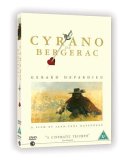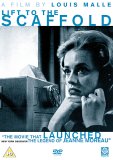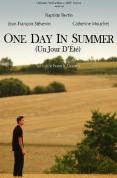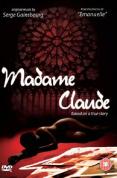![Diva (Vintage World Cinema) [Blu-ray]](/pictures/1169844.jpg) Diva (Vintage World Cinema) | Blu Ray | (06/10/2025)
from £24.98
| Saving you £N/A (N/A%)
| RRP
Diva (Vintage World Cinema) | Blu Ray | (06/10/2025)
from £24.98
| Saving you £N/A (N/A%)
| RRP DIVA (1981) was the directorial debut of Jean-Jacques Beineix (Betty Blue) . Jules (Frédéric Andréi) is a Parisian mail courier in possession of two highly sought-after tapes: the first contains a rare recording of American opera singer Cynthia Hawkins (Wilhelmenia Wiggins Fernandez), with whom he has fallen in love; the second is a tape slipped into his bag by a young woman just before she is murdered. The unwitting Jules thus finds himself being pursued by Taiwanese bootleggers and a thuggish gang of drug dealers who will do anything to get their hands on the cassettes. Blue as Diva: Memories of a cult filmDiva, about the film by Denis Parent
![The Truth About Charlie [2003]](/pictures/1022167.jpg) The Truth About Charlie | DVD | (29/09/2003)
from £6.98
| Saving you £13.00 (260.52%)
| RRP
The Truth About Charlie | DVD | (29/09/2003)
from £6.98
| Saving you £13.00 (260.52%)
| RRP When a woman's husband is murdered on a train, she's pursued by four mysterious men who believe she's hiding her husband's money from them and that they deserve a share of the loot.
![Diva [1981]](/pictures/1074312.jpg) Diva | DVD | (03/05/2004)
from £15.82
| Saving you £4.17 (20.90%)
| RRP
Diva | DVD | (03/05/2004)
from £15.82
| Saving you £4.17 (20.90%)
| RRP Jean-Jacques Beineix (Betty Blue) made a catchy debut as a director with this slick, defiantly superficial 1982 movie about a young mail carrier who illegally records a performance by an opera singer, then gets the tape mixed up with evidence that could incriminate gangsters. Wearing flashy commercialism like a badge, Beineix fills the screen with explosions of disposable pop kitsch. Yet he also tells a fairly compelling story in the process, one that only seems to get more interesting the closer one gets to the end. An unusual experience, Diva should be seen also for the influence it had on the look and feel of movies and music videos in the 1980s. --Tom Keogh, Amazon.com
![Diva (Vintage World Cinema) [Blu-ray]](/pictures/1169802.jpg) Diva (Vintage World Cinema) | Blu Ray | (06/10/2025)
from £16.98
| Saving you £N/A (N/A%)
| RRP
Diva (Vintage World Cinema) | Blu Ray | (06/10/2025)
from £16.98
| Saving you £N/A (N/A%)
| RRP DIVA (1981) was the directorial debut of Jean-Jacques Beineix (Betty Blue) . Jules (Frédéric Andréi) is a Parisian mail courier in possession of two highly sought-after tapes: the first contains a rare recording of American opera singer Cynthia Hawkins (Wilhelmenia Wiggins Fernandez), with whom he has fallen in love; the second is a tape slipped into his bag by a young woman just before she is murdered. The unwitting Jules thus finds himself being pursued by Taiwanese bootleggers and a thuggish gang of drug dealers who will do anything to get their hands on the cassettes. Blue as Diva: Memories of a cult filmDiva, about the film by Denis Parent
 Cyrano De Bergerac | DVD | (17/04/2019)
from £5.30
| Saving you £14.69 (277.17%)
| RRP
Cyrano De Bergerac | DVD | (17/04/2019)
from £5.30
| Saving you £14.69 (277.17%)
| RRP Director Jean-Paul Rappeneau and cowriter Jean-Claude Carriere had the brilliant idea of casting Frances most lovably vulnerable hunk, the massive Gerard Depardieu, in one of French literatures meatiest roles: the sword-wielding poet Cyrano. Equipped with a massive nose and a heart to match, Depardieu soars as the heart-broken soldier who must lendhis words of love to another man to woo the woman he yearns for. Rappeneau spared no expense in taking this Edmond Rostand play into realistic locations for the battle scenes in the second act, making the film as exciting as it is romantic and funny. Depardieu attacks the role in great gulps, consuming all the oxygen in any room he enters. Macho but sensitive, he creates a larger-than-life Cyrano, whose wrenching sadness at the lack of interest from his lady love will have you reaching for the tissues. --Marshall Fine
![Le Corbeau [Blu-ray] [2017]](/pictures/1146013.jpg) Le Corbeau | Blu Ray | (05/03/2018)
from £11.99
| Saving you £N/A (N/A%)
| RRP
Le Corbeau | Blu Ray | (05/03/2018)
from £11.99
| Saving you £N/A (N/A%)
| RRP A veritable masterpiece of French cinema, Henri-Georges Clouzot's (The Wages of Fear, Les Diaboliques) Le Corbeau is a dark and subversive study of human nature starring Pierre Fresnay and Ginette Leclerc. A wave of hysteria sweeps the small provincial town of St. Robin when a series of poison-pen letters signed Le Corbeau (The Raven) appear, denouncing several prominent members of society. Starting with the village doctor, the slow trickle of sinister letters soon becomes a flood and no one is safe from their mysterious accusations. Condemned by the political left and right and the church upon its release in 1943, Clouzot was banned from filmmaking for two years after making the film. This Classic noir is essential viewing from the director often dubbed the French Hitchcock. Features: The Cursed MasterPiece Of Henri Georges Clouzot
![Last Year In Marienbad [Blu-ray] [1961]](/pictures/1094735.jpg) Last Year In Marienbad | Blu Ray | (28/09/2009)
from £21.98
| Saving you £5.00 (25.01%)
| RRP
Last Year In Marienbad | Blu Ray | (28/09/2009)
from £21.98
| Saving you £5.00 (25.01%)
| RRP Considered by many to be Renais' magnum opus L'Ann''e Derni''re '' Marienbad is a work of fantasy and experiment in line with the French New Wave films of the 50's and 60's. Renais and co-writer Alain Robbe-Grillet seem less concerned with the conventional use of character and more interested in the intellectual preoccupations of man. The film consists of a series of memories from a man holidaying at an enchanting European hotel. When a woman seems not to recognize him he reveals that they had spent some time together the year before and that now he has come for her. However the presence of another man in the hotel complicates matters...
![The Hairdresser's Husband [1991]](/pictures/1017240.jpg) The Hairdresser's Husband | DVD | (07/03/2005)
from £24.95
| Saving you £-4.96 (N/A%)
| RRP
The Hairdresser's Husband | DVD | (07/03/2005)
from £24.95
| Saving you £-4.96 (N/A%)
| RRP At the age of 12 Antoine's life is dominated by twin passions dancing to Arabic music and getting his hair cut by the voluptuous middle-aged local hairdresser who inadvertently provides him with his first experience of the opposite sex. Antoine reaches middle age with his passion undiminished: upon meeting shy hairdresser Mathilde he is so taken by her that he proposes marriage. She accepts and he moves into her salon where they pursue their romance with an intensity that blind
![Le Corbeau [DVD] [2017]](/pictures/1145934.jpg) Le Corbeau | DVD | (05/03/2018)
from £11.89
| Saving you £N/A (N/A%)
| RRP
Le Corbeau | DVD | (05/03/2018)
from £11.89
| Saving you £N/A (N/A%)
| RRP A veritable masterpiece of French cinema, Henri-Georges Clouzot's (The Wages of Fear, Les Diaboliques) Le Corbeau is a dark and subversive study of human nature starring Pierre Fresnay and Ginette Leclerc. A wave of hysteria sweeps the small provincial town of St. Robin when a series of poison-pen letters signed Le Corbeau (The Raven) appear, denouncing several prominent members of society. Starting with the village doctor, the slow trickle of sinister letters soon becomes a flood and no one is safe from their mysterious accusations. Condemned by the political left and right and the church upon its release in 1943, Clouzot was banned from filmmaking for two years after making the film. This Classic noir is essential viewing from the director often dubbed the French Hitchcock. Features: The Cursed Masterpiece Of Henri Georges Clouzot
![Cyrano De Bergerac [1990]](/pictures/1006336.jpg) Cyrano De Bergerac | DVD | (20/11/2000)
from £13.67
| Saving you £6.32 (46.23%)
| RRP
Cyrano De Bergerac | DVD | (20/11/2000)
from £13.67
| Saving you £6.32 (46.23%)
| RRP Director Jean-Paul Rappeneau and cowriter Jean-Claude Carriere had the brilliant idea of casting France's most lovably vulnerable hunk, the massive Gerard Depardieu, in one of French literature's meatiest roles: the sword-wielding poet Cyrano. Equipped with a massive nose and a heart to match, Depardieu soars as the heart-broken soldier who must lendhis words of love to another man to woo the woman he yearns for. Rappeneau spared no expense in taking this Edmond Rostand play into realistic locations for the battle scenes in the second act, making the film as exciting as it is romantic and funny. Depardieu attacks the role in great gulps, consuming all the oxygen in any room he enters. Macho but sensitive, he creates a larger-than-life Cyrano, whose wrenching sadness at the lack of interest from his lady love will have you reaching for the tissues. --Marshall Fine
![Cyrano von Bergerac - Classic Selection [Blu-ray] [1990] [Region A & B & C]](/pictures/1158415.jpg) Cyrano von Bergerac - Classic Selection | Blu Ray | (05/09/2019)
from £8.85
| Saving you £N/A (N/A%)
| RRP
Cyrano von Bergerac - Classic Selection | Blu Ray | (05/09/2019)
from £8.85
| Saving you £N/A (N/A%)
| RRP ![The Captive [2001]](/pictures/1006195.jpg) The Captive | DVD | (29/10/2001)
from £31.23
| Saving you £-11.24 (N/A%)
| RRP
The Captive | DVD | (29/10/2001)
from £31.23
| Saving you £-11.24 (N/A%)
| RRP Chantal Akerman's La Captive is a deceptively simple story following the fascination of a wealthy young man for his apparently innocent and lovely girlfriend. Only loosely drawn from Proust's La Prisonniere, the Proustian elements are often largely submerged. Yet as a study in obsession it is balanced somewhere between Death in Venice and Vertigo. A chase through the streets of--an apparently timeless but actually contemporary--Paris, this is a picture of inexplicable obsession, moved along by fragments of whispered dialogue and a glimpse of bizarre daily ritual. With much of the story framed within the odd anti-hero Simon's grandiose apartment (which he appropriately shares with an ailing, rarely glimpsed grandmother), the film cleverly avoids suffocating its viewers by giving odd gasps of breath from the cheeky, light encounters between his girlfriend Ariane and the beautiful Andree--friends, or possibly sometime lovers. As a portrait of a relationship, La Captive will keep its viewers absorbed with its elegant tone and its intriguing and inexplicable story; but it might just as easily frustrate with its unresolved twists and turns.--Tricia Tuttle
 The Louis Malle Collection - Vol. 1 | DVD | (26/06/2006)
from £N/A
| Saving you £N/A (N/A%)
| RRP
The Louis Malle Collection - Vol. 1 | DVD | (26/06/2006)
from £N/A
| Saving you £N/A (N/A%)
| RRP Ascenseur Pour L'Echafaud (1958): In this his debut feature film director Louis Malle captures the hidden beauty of Jeanne Moreau the brilliant camerawork of Henri Decae and the musical force of Miles Davis in a tightly constructed film noir experience that launched his and Moreau's careers. Le Feu Follet (1963): Maurice Ronet stars as an alcoholic writer who upon leaving a drying-out clinic decides to commit suicide. He elects to visit all his friends to see if
![Maitresse [1976]](/pictures/1019012.jpg) Maitresse | DVD | (28/07/2003)
from £19.79
| Saving you £0.20 (1.01%)
| RRP
Maitresse | DVD | (28/07/2003)
from £19.79
| Saving you £0.20 (1.01%)
| RRP Originally rejected outright by the BBFC in 1976 and then released with nearly 5 minutes of cuts in 1981 Maitresse is now finally released uncut on DVD. Bulle Ogier plays a professional dominatrix who indulges in a conventional romance with Gerard Depardieu on the ground floor but satisfies more demanding clients in her 'dungeon'. Director Barbet Schroeder apparently cast genuine masochists in this wickedly funny fable on the foibles of sex and love...
![The Hairdresser's Husband [1991]](/pictures/1006357.jpg) The Hairdresser's Husband | DVD | (25/09/2000)
from £19.16
| Saving you £0.83 (4.33%)
| RRP
The Hairdresser's Husband | DVD | (25/09/2000)
from £19.16
| Saving you £0.83 (4.33%)
| RRP At the age of 12 Antoine's life is dominated by twin passions dancing to Arabic music and getting his hair cut by the voluptuous middle-aged local hairdresser who inadvertently provides him with his first experience of the opposite sex. Antoine reaches middle age with his passion undiminished: upon meeting shy hairdresser Mathilde he is so taken by her that he proposes marriage. She accepts and he moves into her salon where they pursue their romance with an intensity that blinds them to the mundane realities of the outside world.
 Ascenseur Pour L'Echafaud | DVD | (26/03/2007)
from £N/A
| Saving you £N/A (N/A%)
| RRP
Ascenseur Pour L'Echafaud | DVD | (26/03/2007)
from £N/A
| Saving you £N/A (N/A%)
| RRP In his mesmerizing debut feature film twenty-four-year-old director Louis Malle brought together the beauty of Jeanne Moreau the camera work of Henri Deca and a now legendary score by Miles Davis. A touchstone of the careers of both its star and director Elevator to the Gallows (Ascenseur Pour L'Echafaud) is a richly atmospheric thriller of murder and mistaken identity unfolding over one restless Parisian night.
 One Day in Summer | DVD | (29/01/2007)
from £N/A
| Saving you £N/A (N/A%)
| RRP
One Day in Summer | DVD | (29/01/2007)
from £N/A
| Saving you £N/A (N/A%)
| RRP A rural village in France becomes saturated with anxiety when a tragic accident results in the death of a local teenage boy. The heat-drenched summer landscape acquires a sinister aspect as everyone looks for someone to blame. Amidst this tense dissection of a small community's secrets the film casts a restrained yet penetrating gaze upon the life-changing summer of a teenage boy. After the death of his best friend Sebastien has to come to terms with conflicting feelings towards him a mix of longing and resentment complicated by past bereavments class difference and Sebastien's burgeoning uncertain sexuality.
 Madame Claude | DVD | (26/06/2006)
from £N/A
| Saving you £N/A (N/A%)
| RRP
Madame Claude | DVD | (26/06/2006)
from £N/A
| Saving you £N/A (N/A%)
| RRP By day they were the highest-paid models in Paris. At night they practiced the world's oldest profession and they all worked for Madame Claude. These elegant classy and beautiful women are culled from all walks of life and trained to satisfy the world's most influential political and financial leaders... no matter how outrageous their desires. When one of the women is found dead in a photographer's apartment he escapes prosecution by agreeing to obtain a list of Madame Claude's prom
![Mr. Klein (Criterion Collection) [Blu-ray]](/pictures/1160243.jpg) Mr. Klein (Criterion Collection) | Blu Ray | (10/05/2022)
from £N/A
| Saving you £N/A (N/A%)
| RRP
Mr. Klein (Criterion Collection) | Blu Ray | (10/05/2022)
from £N/A
| Saving you £N/A (N/A%)
| RRP 
Please wait. Loading...
This site uses cookies.
More details in our privacy policy